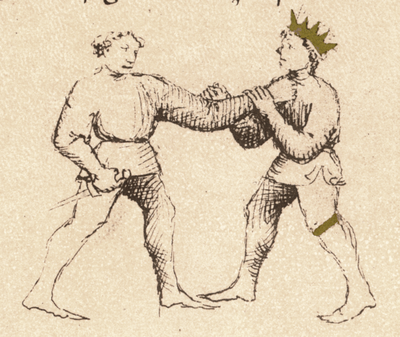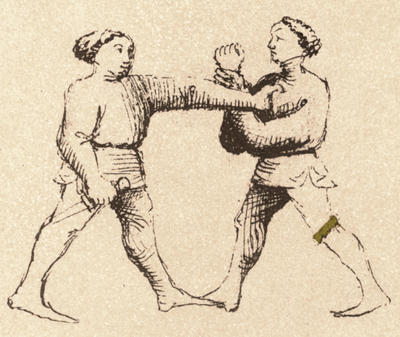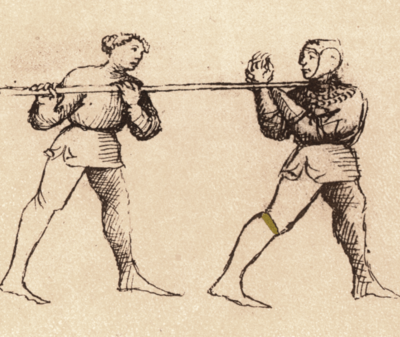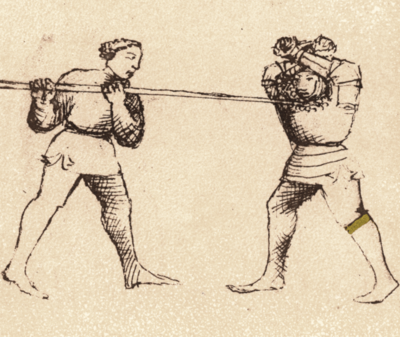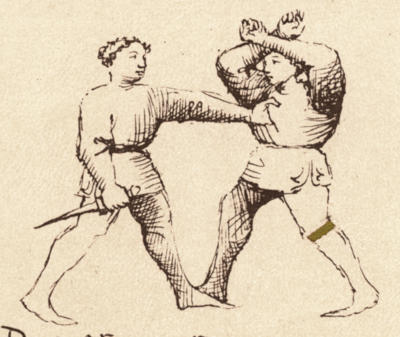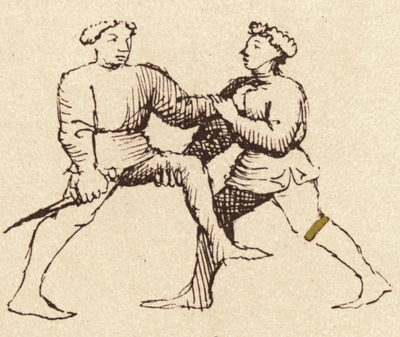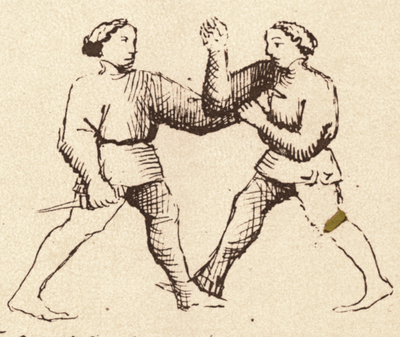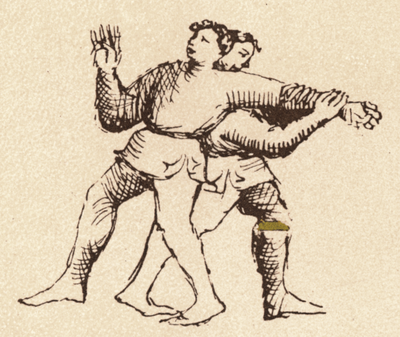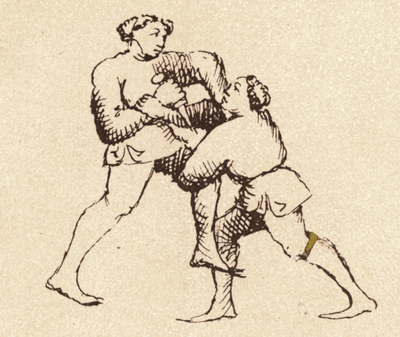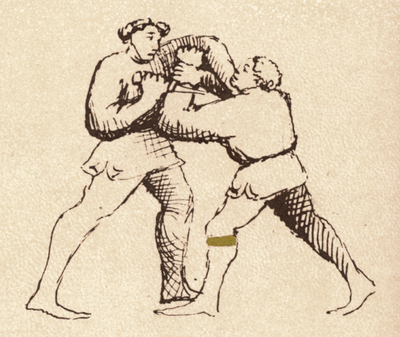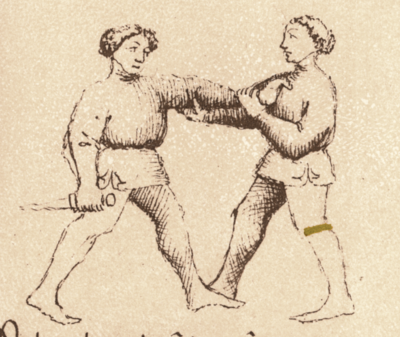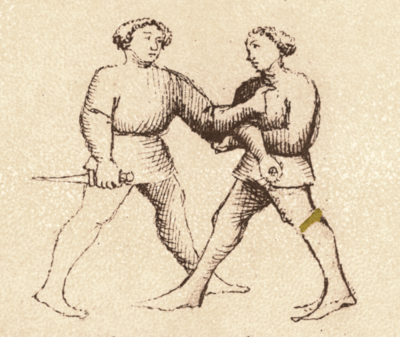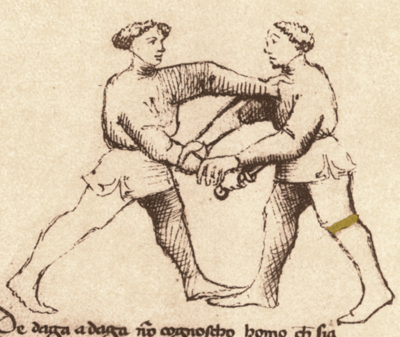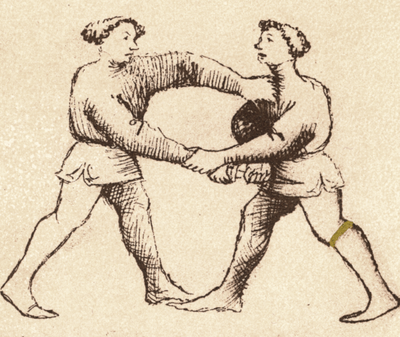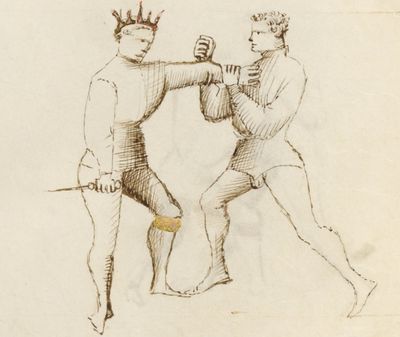|
|
You are not currently logged in. Are you accessing the unsecure (http) portal? Click here to switch to the secure portal. |
Fiore de'i Liberi/Dagger/5th master
Images |
Illustrations |
Completed Translation (from the Getty and PD) |
Draft Translation (from the Paris) |
Morgan Transcription (1400s) |
Getty Transcription (1400s) |
Pisani Dossi Transcription (1409) |
Paris Transcription (1420s) |
|---|---|---|---|---|---|---|---|
[66] I want each of my students to know I am the Fifth Dagger Remedy Master who defends against the collar grab made by this player. Before he can strike me with his dagger I destroy his arm like this, because the grip he has on me is actually to my advantage. And I can do all of the covers, holds and binds of the other remedy masters and their students who came before me. And I say this from experience: all who study this art should be aware that you cannot successfully defend the collar grab unless you move quickly. |
You would grasp my chest. Thus far you have not been able to wound me. |
[38r-d] ¶ Io son Quinto Re Magistro per lo cavezzo tenudo di questo zugadore. Inanzi ch'ello mi traga cum sua daga, per questo modo gli guasto lo brazo, per che lo tenir ch'ello mi tene a mi e grande avantazo. Che io posso far tutte coverte prese e ligadure degl'altri magistri rimedii e di lor scolari che sono dinançi. Lo proverbio parla per exempio. Io voglio che ogn'un'ch'a scolaro in quest'arte sazza, che presa di cavezo nissuna deffesa no impaça. |
[10a-e] Io voio che çaschadun de mi magistro saça |
[33v-d] ¶ Pectore me prendis. Nec adhuc mihi ledere posses. | |||
[67] After striking against your elbow, I will continue on This is another way to destroy the arm. And from this play I can move to other plays and holds… |
I would now strike close by your elbow. You will then move past me, |
[38v-a] ¶ Questo e un altro modo di guastarte lo brazzo. E per venir in altri zoghi q e prese, io questo zogho fazo. Anchora digo che se fossi afferradi d'una lanza cum tal firir in lei, overo che me disferraria, overo che l'asta del ferro io partiria. |
[10a-f] Per questo ferire apresso el tuo cubito me conven lassar |
[34r-b] ¶ Te prope nunc cubitum feriam. me deinde relinques. | |||
[68] I will get rid of your spear with my arms in this way, …Also, if you are pinned by a spear then by making this strike against it you will either unpin yourself or break off the haft from the spearhead. |
[16b-d] Cum li braçi a'questo modo me voio disferare |
||||||
[69] If I want to get this spear off me, This is another way to make you let go, and is also a better method of breaking off the head of a spear… |
[38v-b] ¶ Questo e un altro far lassar anchora e meglor da disferar una lanza. Anchora digo che se cum forza io ti fiero in la zuntura dela man che mi tene per lo cavezzo, Io mi tegno certo che io te la dislogaro, se tu non la fuzi via. Lo contrario io lo voglio palentare. In quello che lo scolar vene zo cum gli brazzi per dislogar la mane delo zugadore, subito lo zugadore de tore via la mano del cavezzo delo scolar. E subito cum la daga in lo petto lo po guastar. |
[16b-c] Si de questa lança me voio disferare |
|||||
[70] By striking to your wrist or to your elbow, …Also if I strike you hard in the wrist joint of the hand holding my collar, I am certain to dislocate it unless you let go. I wish to tell you the counter. As the student strikes down with his arms to dislodge the player's hand, the player quickly withdraws his hand from the student’s collar, and he then quickly strikes the student in the chest with his dagger. |
Either I will strike over the elbow, or near the fist, |
[10b-a] Apresso tuo pugno feriro o sopra el cubito |
[34r-d] ¶ Vel supra cubitum feriam vel deprope pugnum. | ||||
[71] I am confident and certain that you will go to the ground, This play will make you let go of me. And in addition, if I advance my right foot behind your left foot, you will be thrown to the ground without fail. And if this play is not enough, I will try others on your dagger, because my heart and my eyes are never focused anywhere other than upon taking away your dagger quickly and without delay. |
I am able to safely believe that you will go into the ground now; |
[38v-c] ¶ Per questo modo in terra ti voglio butare inanzi che la daga mi vegna aproximare. E si la daga tua sara a'mezo camm per me ferire, Le prese ch'i'o lassaro e la tua daga voro seguire. Che tu no mi pora offender per modo che sia, che cum li zoghi deli rimedii ti faro vilania. |
[10b-c] De andar in terra tentene certo e seguro |
[34v-d] ¶ Tutus ut in terram nunc vadas, credere possum. | |||
[72] I choose to try this method of throwing you to the ground, I will throw you to the ground like this, before your dagger can get near me. And if your dagger comes down the center line to strike at me, I will release my grip and deal with your dagger, so that you will not be able to injure me in any way. Then with the remedy plays I will make you suffer. |
I put to the test where I would at once lay you sharply on your back.[2] |
[38v-d] ¶ Questo e un zogho di farse lassar, Salvo che si lo mio pe dritto dredo lo tuo stancho io faczo[!] avanzare, tu porissi andar in terra senza fallo. E si questo zogho a mi non basta, Cum altri, dela tua daga ti faro una tasta. Pero che'l mio chore e'l'ochio altro non guarda, che a tor ti la daga senza dimora e tarda. |
[10b-b] Per riverssarte in terra io voio provare aquesto modo |
||||
[73] You will find out that over my right shoulder This player had me grabbed by the collar, but before he could strike me with his dagger I quickly seized his left hand with my hands and pulled his arm over my shoulder so as to dislocate it, and then I completely dislocated it. But this play is safer to do in armor than unarmored. |
I will not have been cheated of breaking the left shoulder;[4] |
[15r-a] ¶ Questo zugadore mi tegniva per lo cavezzo. & io subito inanzi che ello tressi cum la daga, cum ambe le mie man presi la sua man stancha. E'l so brazzo stancho zitai sopra lo mio dritto per dislogargli lo ditto brazzo. Che ben gl'elo del tutto dislogado. Questo faria piu siguro armado che disarmado. |
[10b-d] Tu senti che sopra la mia drita spalla |
[35r-b] ¶ Non deceptus ero levum frangendo lacertum. | |||
[74] By the way I seize you and hold you, In this way I will hurl you to the ground without fail. And I will surely take your dagger. And if you are armored that may help you, since I will be aiming to take your life with your own dagger. But even if we are armoured, this art will not fail me. And if you are unarmored and very quick, other plays can be made besides this one. [In the Getty and Paris, the Scholar's right foot is inside (in front) of his opponent's left leg.] |
I hold you using this form, and I will catch the lamenting one; |
[15r-b] ¶ In questo modo te zitiro per terra che non mi po fallire. E la tua daga prendero a non mentire. Se tu saray armado, lo te pora zovare, che cum quella propia ti toro la vita. Se noii semo armadi, l'arte non o fallida. Ben che si uno e disarmado e sia ben presto, degl'altri zoghi po far asai & anchora questo. |
[10b-e] Per lo modo ch'io ti tegno e t'o preso |
[35r-d] ¶ Te tali teneo forma / prendoque gementem / | |||
[75] To take your dagger I make a cover like this, This cover is very good in armor or without armor. And against any strong man such a cover is good for covering an attack from below as well as from above. And from this play you can enter into a middle bind as shown in the third play of the First Dagger Remedy Master. And if the cover is made in response to an attack from below, the student will put the player into a lower lock also known as “the strong key”, as shown in the sixth play [38] of the Third [Dagger] Remedy Master who plays to the reverse hand attack. |
Now I make this cover, for which reason <read: in order that> I would be able to take away the dagger, |
[15r-c] ¶ Questa coverta in Arme e senz'arme e molto bona. E contra zaschun homo forte, tanto e bona a chovrir di sotto mane quanto di sopra. E questo zogho intra in ligadura mezana, çoe al terzo zogho del primo Re e rimedio di daga. E si la ditta coverta si fa sotto mane, lo scolaro mette lo zugadore in ligadura de sotto, zoe in la chiave forte ch'e sotto lo terzo Re e rimedio ch'e zoga a man riversa a lo Sesto zogho. |
[10b-f] Per tor tua daga tal coverta io faço |
||||
[76] If I can turn this arm of yours, If I can turn this arm I will be certain to put you into the lower lock also known as “the strong key”. I will however be able to do this more safely if I am armored. I could also do something else against you: if I grip your left hand firmly and seize you under your left knee with my right hand, then I will not lack the strength to put you to the ground. |
If I can now twist your shoulder while fighting, |
[15r-d] ¶ Si questo brazzo posso voltare io non mi dubito che in la ligadura de sotto e chiave forte ti faro intrare. Ben che siando armado piu sigura mente se poria fare. Ancho poria altro contra ti fare se io tegno la mane stancha ferma e cum la dritta ti piglio sotto al zinochio la gamba stancha per metter te in terra forza non mi mancha. |
[11a-a] Si io posso aquesto tuo braço voltare |
[35v-d] ¶ Volvere si possum tibi nunc certando lacertum / | |||
[77] Whether you try to strike at me from above or below, With arms crossed I await you without fear. And I don't care whether you come at me from above or below, because however you come at me, you will be bound. You will be locked either in the middle lock or the lower lock. And if I wished to make the plays of the Fourth Dagger Remedy Master, I would cause you great harm with these plays. And I will have no difficulty in taking your dagger. [In the Getty, the Scholar's left foot is forward.] |
[15v-a] ¶ Cum gli brazzi crosadi t'aspetto senza paura. Tra voii di sotto e voii di sopra che non fazzo niente cura, che per ogni modo che tu mi trara tu sarai ligado. O in la ligadura mezana, o in la sottana tu saraii serato. Ben che se volesse far la presa che fa lo quarto Re, rimedio di daga cum gli zogi soii, asai male te faria. E a torti la daga non mi mancharia. |
[11a-b] Si de soto, o de sovra tu te miti a'trare |
|||||
[78] By holding your arm with my two hands, This grip is sufficient to prevent you being able to touch me with your dagger. And from here I can do the play that comes after me. And I could also certainly do other plays to you. I disregard the other plays for now, however, because this one is good for me and very fast. |
Now because I am holding you using both hands during wrestling, |
[15v-b] ¶ Questa presa mi basta che cum tua daga non mi poii tochare. Lo zogho che m'e driedo quello ti voglo fare. E altri zoghi asaii ti poria fare sença alchun dubito. I'lasse gl'altri per che questo m'e bon e ben subito. |
[11a-c] Per lo tuo braço che cum due man e tegno. |
[36r-b] ¶ Nunc quia te manibus teneo luctando gemellis | |||
[79] The student who came before me did not make this play, This is the play referred to by the student who came before me, and I take away this dagger as he indicated. And to disarm him I push his dagger downwards and to the right as written above. And then by making a turn with his dagger I will thrust the point into his chest without fail. [In the Getty and Paris, the Scholar's left foot is forward, and his opponent's right foot is forward.] |
Now I teach taking the dagger away while wrestling the associate; |
[15v-c] ¶ Questo Scolaro che m'e denanzi questo e suo zogho pero che questo tore di daga io lo façço in suo logho, che cargo la sua daga inverso la terra dritto, per torgli la daga como si sopra e scritto. E per la volta che ala daga faro fare. La punta in lo petto gli mettero senza fallare. |
[11a-d] Lo scolar che denanci non fa suo zogho |
[36r-d] ¶ Tollere nunc doceo dagam ludendo sodalj. | |||
[80] So that this student cannot dislocate my arm, I pull it towards me and bend it. And the farther I pull it towards me and bend it, the better, because in this way I make the counter to the Remedy Master of the close play of the dagger. |
[15v-d] ¶ A ço che questo scolaro non mi possa lo Brazzo dislogare io lo tegno curto e linzinado. E si io li tignisse piu linçinado saria anchora meglio, per chi i faço lo contrario del Re e magistro del zogho stretto dela daga. |

